Honey, the golden nectar produced by bees, has been a staple in human diets for centuries. Among the diverse varieties of honey available, natural forest honey stands out as a unique and exquisite product. Unlike its commercially processed counterparts, natural forest honey is harvested from wild, untouched landscapes, offering a distinctive flavor profile and a host of health benefits.
The Origin of Natural Forest Honey:
Natural forest honey is sourced from bees that forage in diverse and pristine ecosystems, such as dense woodlands, untouched meadows, and remote mountainsides. Unlike honey produced in controlled environments like apiaries, natural forest honey is a true reflection of the surrounding flora, capturing the essence of the varied plant life in the region.
Characteristics of Natural Forest Honey:
- Flavor Profile:
- The taste of natural forest honey is a symphony of flavors, ranging from floral and fruity to earthy and woody.
- The diverse range of flowers, herbs, and trees in the wild contributes to the honey’s complex and unique taste.
- Color Variations:
- The color of natural forest honey can vary widely, depending on the plants the bees have foraged on. It may range from light amber to dark brown.
- This diversity in color is a visual testament to the richness of the surrounding ecosystem.
- Texture:
- Natural forest honey often has a thicker and more robust texture compared to commercially produced honey. This is due to the presence of pollen, propolis, and other natural particles.
Health Benefits of Natural Forest Honey:
- Antioxidant Properties:
- The diverse plant sources contribute to the high antioxidant content of natural forest honey, which helps combat oxidative stress in the body.
- Antibacterial and Antifungal Properties:
- The natural enzymes and compounds present in forest honey have been shown to possess antibacterial and antifungal properties, aiding in the prevention of infections.
- Immune System Support:
- Regular consumption of natural forest honey may contribute to a strengthened immune system, thanks to its rich nutrient content and natural healing properties.
- Allergy Alleviation:
- Some people believe that consuming local natural honey can help alleviate allergies by exposing the body to small amounts of local pollen.
Sustainability and Conservation:
Harvesting natural forest honey is an age-old practice that, when done sustainably, can contribute to the conservation of wild ecosystems. However, it’s crucial to ensure responsible and ethical honey harvesting to protect the delicate balance of these environments.
Conclusion:
Natural forest honey is not just a sweet treat; it’s a testament to the biodiversity and natural beauty of the landscapes from which it originates. As consumers become increasingly conscious of the origins and processing methods of their food, natural forest honey stands out as a symbol of purity, authenticity, and a harmonious relationship between humans and nature. So, the next time you savor a spoonful of natural forest honey, remember that you’re not just tasting sweetness; you’re indulging in the essence of untouched wilderness.

